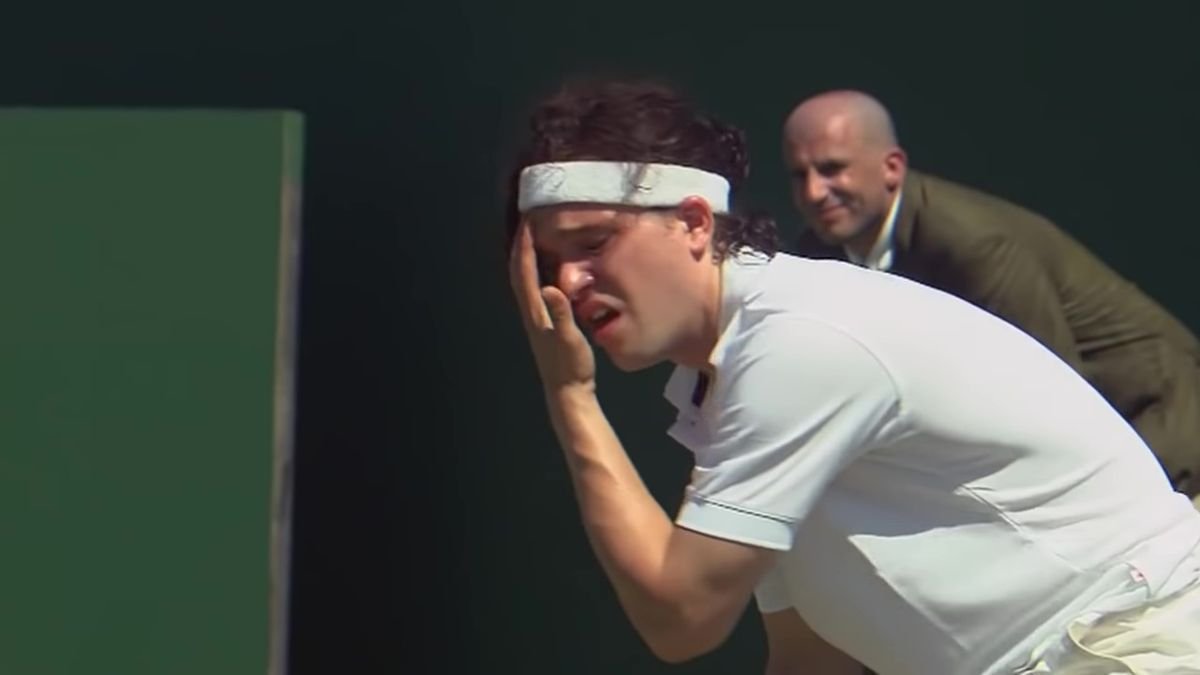7 Days in Hell did Challengers before Challengers – threesomes and all
It sometimes seems surprising that tennis doesn’t inspire more films. The one-on-one gladiatorial combat is inherently dramatic and psychological, while the devious scoring system ensures that no match is ever lost until it is lost. Nail-biting climaxes and last-minute turnarounds are baked into the design. On the other hand, the fast-moving, see-saw action is technically difficult to portray in a way that’s both exciting and readable – and that same scoring system could drastically confuse anyone who doesn’t follow the sport.
Or maybe there are only so many tennis stories to tell. That’s certainly true after watching Challengersthe scorching, wildly entertaining new tennis melodrama starring Zendaya and directed by Call me by your name‘s Luca Guadagnino, I was struck by some surprising similarities with an earlier film. Only this film is not a real sports film, or even a pseudo-serious piece of prestige pulp Challengers. 7 days in hell is an extremely wacky 43-minute HBO mockumentary from 2015, starring The Lonely Island’s Andy Samberg and streaming on Hulu and Max.
It’s hard to prove my point without completely spoiling both films. You should check them both out; they are both very nice. Let’s just say both feature a hotly contested, emotionally (and perhaps sexually) charged match between rival male players that goes to the extreme – and beyond. Both films also feature varying degrees of steamy threesome action; an absurdly elaborate, physically impossible rally at the net; and a certain gesture that kicks things into high gear. And they both end in a strikingly similar way, even if the actual outcomes are very, very different.
Image: HBO

Image: HBO

Photo: Niko Tavernise/Metro-Goldwyn-Mayer Images
Above: Andy Samberg and Kit Harington in 7 days in hell. Below: Mike Faist and Josh O’Connor inside Challengers.
Perhaps the key to the success of both films is their recognition that tennis, with its strange rituals, hours-long matches, hushed intensity and soundtrack of echoing bangs, grunts and claps, is actually quite ridiculous. Guadagnino’s film spends more than two hours skirting the line of high camp, spurred on by Trent Reznor and Atticus Ross’ pounding gay club score. 7 days in hell is a total parody; there is no such restraint, if restraint is the word.
7 days in hell spoofs an ESPN 30 for 30-style sports documentary. The subject is the longest match in tennis history, a first-round match at Wimbledon that lasted seven days. The best seed is Charles Poole (Game of Thrones‘ Kit Harington), a tragically dim Brit who carries the country’s hopes on his shoulders. The wildcard is Aaron Williams (Samberg), a washed-up “bad boy of tennis” in the Andre Agassi mold who happens to be the adoptive brother of Venus and Serena Williams. (In one of many talking cameos from famous real-world tennis figures, Serena explains that her father, Richard, adopted a white boy off the street and turned him into a tennis pro in “reverse form.” Blind side.”) Aaron is on his way to a comeback after killing a line umpire with a 200mph serve in the 1990s.
7 days in hellThe main target of the Grand Slam tournaments is the absurdly long matches that the Grand Slam tournaments are known for – especially Wimbledon, where rain often postpones play until the next day and tiebreaks were only used in 2019 the final set, making endless matches theoretically possible. . The film revels in the absurdism and masochism of both playing and watching the sport, as rain, streakers, traffic accidents, magic tricks and more conspire to trap the two players and their audience in a painful week-long death spiral.
The fun comes from it 7 days in hell‘s extremely broad, even crude humor (you’ll have to enjoy dick jokes – this is a Samberg joint, after all) mixed with its ferocious parody of both the tennis world and the sports documentary format. The film’s best gag is a brilliantly sustained digression into the history of Swedish courtroom sketching, delivered to full deadpan by tennis legends John McEnroe and Chris Evert, as well as the film’s stacked cast of comedic actors. It’s a sly satirization of the way doctors can use celebrity and misappropriated expertise as a vehicle for all kinds of barely relevant, unresearched information.
Among those self-deprecating talking heads, McEnroe is particularly valuable throughout. (His best quote: “Aaron probably should have lost after he killed a man. But he didn’t, because he’s an asshole.” McEnroe remains undefeated in swearing.) David Copperfield also directs himself beautifully. The professional performers are great too, with Fred Armisen as All England Club chairman Edward Pudding, MCU veteran Karen Gillan as Charles Poole’s ex-girlfriend, Mary Steenburgen as his overbearing mother, Lena Dunham as a fashion CEO, and an unforgettable twist by Michael Sheen as Caspian Wint, a perverted, chain-smoking British sports broadcaster. The smooth narration comes from Jon Hamm.
Before things come to a head on day seven of the match, the two players will hold a joint press conference. A dispute ensues, and they face off against each other, throwing insults, in an argument that briefly turns into a confused, thwarted embrace. Fundamentally, 7 days in hell And Challengers say the same two things. One: Sports may be about competition and dominance, but the line between dominance and desire is thin. And two: Tennis is absurd.
7 days in hell is streaming on Max, Hulu, and YouTube (with a subscription) and can be rented Apple TV, Google Playand other digital platforms.
